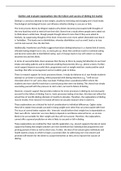Outline and evaluate explanations into the failure and success of dieting (16 marks)
Dieting is a conscious attempt to lose weight, usually by restricting and changing one’s food intake.
Psychological and biological factors can influence whether dieting is a success or fails.
The ironic process theory by Wegner explains why dieters becomes preoccupied with thoughts of
the very food they wish to restrict from their diet. Stems from a study where people were asked not
to think about a white bear, though people thought about it more than if they were asked to.
Similarly, by suppressing thoughts of the food, it becomes even more salient (desirable) now that it
is ‘forbidden.’ This leads one to disinhibition, whereby disinhibitors such as smell, lead us to lose
control and overeat, thus the diet fails.
Additionally, Heatherton and Polivy suggest that failure dieting behaviour is a chained link of events,
whereby lasting weight loss is rare, so many give up, those that continue result to restricted eating
and become vulnerable to disinhibited eating. Lack of change leads to low self esteem so change
becomes less and less likely.
In terms of successful diets, Boon proposes that the key to this is by paying full attention to our food
intake and eating patterns and to eliminate anything that prevents this e.g., phone screens. Further,
social support impacts successful diets, programmes such as weight watchers create positive social
meetings that offer encouragement and set realistic goals to follow.
There is research support for ironic processes theory. A study by Adrianse et al. saw female students
attempt to cut down on snacking, whilst presented with dieting intentions e.g. “I will not eat
chocolate when I’m sad” and a diary was kept. Findings show a paradoxical effect where the
students ate more calorific foods than a control group that were not dieting. This shows how simply
associating yourself with the pressure to start a diet, can lead to failure of dieting.
However, research support that provides evidence for ironic processes in dieting do not necessarily
account for the failure of dieting. Due to, ironic processes lasting a few days, this does not reflect the
actual time of real-life dieting attempts of months to decades. Therefore, the explanations of dieting
may be invalid, if the research it is based off does not actually measure what it claims to.
These explanations are criticised for lack of consideration to individual differences. Ogden states
they fail to explain how people succeed in losing weight even when they are preoccupied with food.
The locus of control better explains this. ‘Internals’ would believe their weight loss is dependable on
their own efforts. ‘externals’ are more likely to depend on and blame external forces, so are less
likely to be accountable for their weight and thus will not succeed. Therefore, the explanations
cannot offer a general prediction on who is likely to succeed or fail in dieting.
These explanations are credited for their real-life application. E.g., Kovach supports the idea of social
support by finding that weight watchers are more beneficial than individual diet programmes over
prolong periods of time as well as short ones. Further, the idea of low esteem gives individuals and
health experts a basis on which to begin a successful diet, by addressing one’s low esteem and
promote self-esteem for the dieter to accept themselves as they are to improve the success of
dieting.





